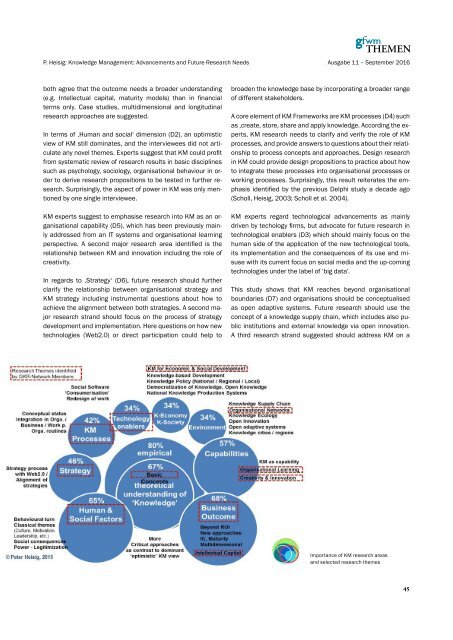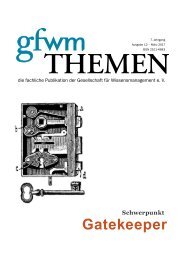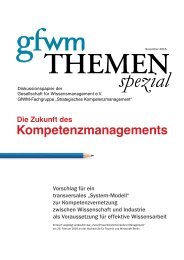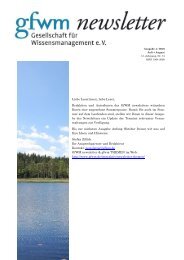gfwmTHEMEN11_Sep2016
Erfolgreiche ePaper selbst erstellen
Machen Sie aus Ihren PDF Publikationen ein blätterbares Flipbook mit unserer einzigartigen Google optimierten e-Paper Software.
eine Fachpublikation der Gesellschaft für Wissensmanagement e.V.<br />
P. Heisig: Knowledge Management: Advancements and Future Research Needs Ausgabe 11 – September 2016<br />
both agree that the outcome needs a broader understanding<br />
(e.g. Intellectual capital, maturity models) than in financial<br />
terms only. Case studies, multidimensional and longitudinal<br />
research approaches are suggested.<br />
In terms of ‚Human and social‘ dimension (D2), an optimistic<br />
view of KM still dominates, and the interviewees did not articulate<br />
any novel themes. Experts suggest that KM could profit<br />
from systematic review of research results in basic disciplines<br />
such as psychology, sociology, organisational behaviour in order<br />
to derive research propositions to be tested in further research.<br />
Surprisingly, the aspect of power in KM was only mentioned<br />
by one single interviewee.<br />
KM experts suggest to emphasise research into KM as an organisational<br />
capability (D5), which has been previously mainly<br />
addressed from an IT systems and organisational learning<br />
perspective. A second major research area identified is the<br />
relationship between KM and innovation including the role of<br />
creativity.<br />
In regards to ‚Strategy‘ (D6), future research should further<br />
clarify the relationship between organisational strategy and<br />
KM strategy including instrumental questions about how to<br />
achieve the alignment between both strategies. A second major<br />
research strand should focus on the process of strategy<br />
development and implementation. Here questions on how new<br />
technologies (Web2.0) or direct participation could help to<br />
broaden the knowledge base by incorporating a broader range<br />
of different stakeholders.<br />
A core element of KM Frameworks are KM processes (D4) such<br />
as ‚create, store, share and apply knowledge. According the experts,<br />
KM research needs to clarify and verify the role of KM<br />
processes, and provide answers to questions about their relationship<br />
to process concepts and approaches. Design research<br />
in KM could provide design propositions to practice about how<br />
to integrate these processes into organisational processes or<br />
working processes. Surprisingly, this result reiterates the emphasis<br />
identified by the previous Delphi study a decade ago<br />
(Scholl, Heisig, 2003; Scholl et al. 2004).<br />
KM experts regard technological advancements as mainly<br />
driven by techology firms, but advocate for future research in<br />
technological enablers (D3) which should mainly focus on the<br />
human side of the application of the new technological tools,<br />
its implementation and the consequences of its use and misuse<br />
with its current focus on social media and the up-coming<br />
technologies under the label of ‘big data’.<br />
This study shows that KM reaches beyond organisational<br />
boundaries (D7) and organisations should be conceptualised<br />
as open adaptive systems. Future research should use the<br />
concept of a knowledge supply chain, which includes also public<br />
institutions and external knowledge via open innovation.<br />
A third research strand suggested should address KM on a<br />
Importance of KM research areas<br />
and selected research themes<br />
45










